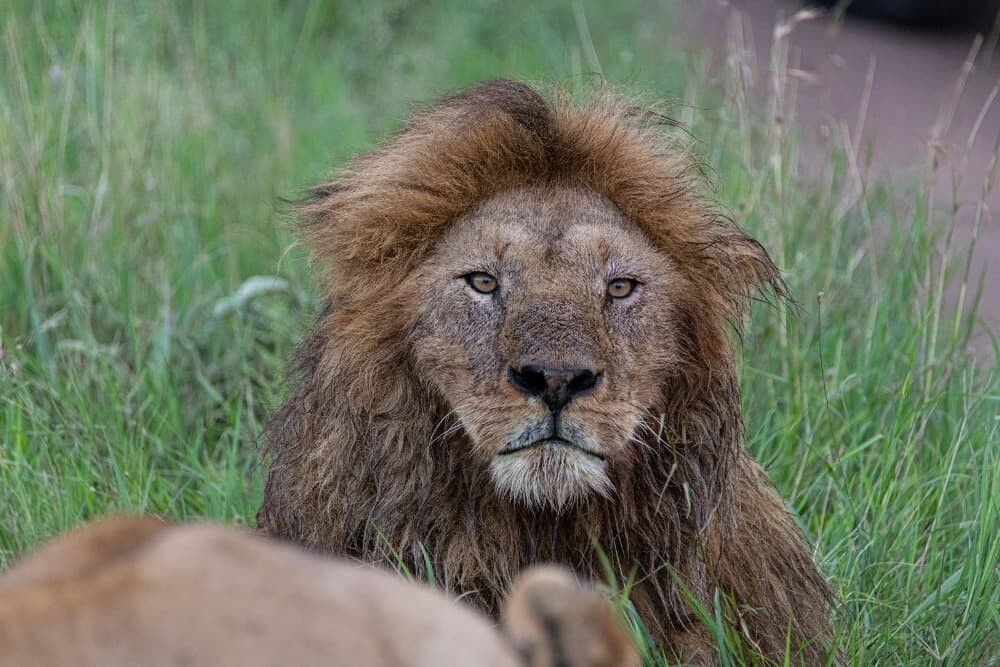Cooperating Volunteers offers various destinations where you can have an incredible adventure, such as going on a safari during your volunteering experience. Uganda, Kenya, Tanzania… countries with numerous national parks where you can embark on this activity.
And, of course, you’ll have the chance to see impressive animals in their natural habitat.
Today, we want to talk about the African lion, its characteristics, and some interesting facts that make it the ‘King of the Jungle’ (even though its habitat is actually the plains and savannas). Lions are found in different regions of Africa, especially south of the Sahara, although they have disappeared from many areas due to hunting and habitat loss.

The African lion is one of the most iconic predators and belongs to the felid family. Unlike other members of this family, lions are unique in that they live in prides.
Males are larger than females, reaching up to 2.5-3 meters in length and weighing between 150 and 250 kg, while females weigh between 120 and 180 kg. Males also have a thick mane around their heads that changes color and density depending on age, health, and genetics; a dark mane usually indicates good health and vigor.
Lions are carnivorous animals, primarily feeding on zebras, antelopes, and buffaloes. Although males are more robust, it is the females who are the primary hunters in the pride. Their agility and teamwork allow them to take down large prey. A pride typically consists of several related females and their offspring, along with one or more dominant males. The males protect the territory, while the females are the hunters. Hunts are usually more successful at night or dawn when they can use the darkness to approach their prey. They are opportunistic hunters and can also target smaller prey when necessary.
Lionesses typically give birth to 1 to 4 cubs after a gestation period of about 110 days. The cubs are born blind and are completely dependent on their mothers for the first few months of life. Did you know that females tend to synchronize their reproductive cycles to raise their cubs together? This way, the cubs can be nursed by any lactating female in the pride, improving their chances of survival.

Lions are extremely territorial, with prides defending large areas of up to 250 km2. Males patrol the boundaries of their territories, using loud roars and urine marks to warn off intruders. A lion’s roar can be heard up to 8 kilometers away and is a crucial communication tool, especially for warning other males and maintaining cohesion within the pride. The roar also helps pride members locate each other across vast territories. When a new group of males takes over a pride, they often kill any cubs that are not theirs, which induces the females to come into estrus more quickly and ensures the transmission of the new males’ genes.
Lions play a key role as apex predators in their ecosystem. They control the population of large herbivores, which in turn regulates vegetation and maintains ecosystem balance. The decline in lion populations in some regions has led to imbalances where herbivore species grow uncontrollably, negatively impacting the habitat. The African lion is classified as vulnerable by the International Union for Conservation of Nature (IUCN) due to the decline of its population in the wild. The main threat to African lions is habitat loss due to agricultural expansion and urbanization. This reduces available hunting areas and increases conflicts with humans, where lions may be hunted for preying on livestock. Poaching and trophy hunting are also serious problems. In some cases, lions are hunted for their parts (especially bones and teeth) used in traditional medicine. Lions are also susceptible to diseases, such as bovine tuberculosis and canine distemper, which have affected several populations.
Many conservation organizations are working to protect lions by creating protected areas, implementing community conservation programs, and educating to reduce conflicts between lions and humans. In some countries, sustainable tourism programs have helped protect lion habitats, as tourism generates income that can be reinvested in conservation.
The total population of African lions has decreased over the last 50 years, with current estimates of between 20,000 and 25,000 individuals in the wild. This represents a drastic reduction compared to previous centuries when they were found throughout almost the entire African continent and parts of Asia. Today, lions are practically confined to reserves and national parks, with stable populations in some countries, such as South Africa, Botswana, and Namibia, but critically threatened in others.
Throughout history, the lion has been a symbol of power, nobility, and royalty in many cultures. In Africa, the lion appears in mythologies and traditions, often seen as a symbol of strength and protection. Lions also feature prominently on many flags, emblems, and statues, not only in Africa but around the world.
In Egyptian mythology, the goddess Sekhmet, depicted with the head of a lioness, was a deity of war and vengeance, as well as a protector of the pharaohs. In many African cultures, the lion is regarded as a sacred animal or a guardian spirit.
In summary, the African lion is much more than a great predator; it plays a crucial role in maintaining the balance of African ecosystems and serves as a powerful cultural symbol. However, its survival is facing increasingly significant challenges.
Would you like to see it up close?
WE LOOK FORWARD TO YOUR VISIT!




